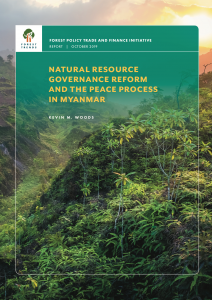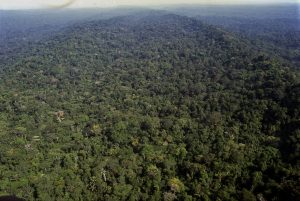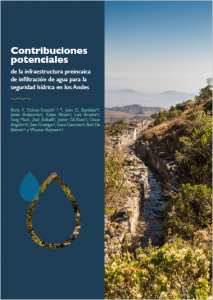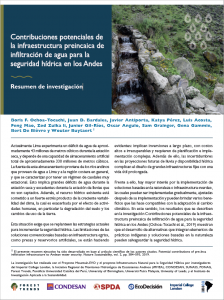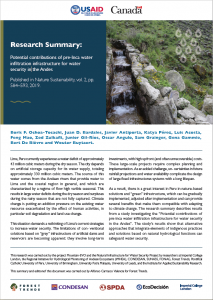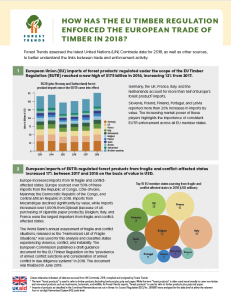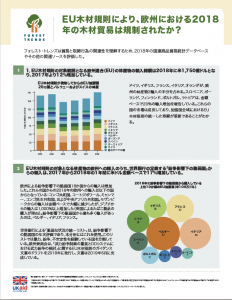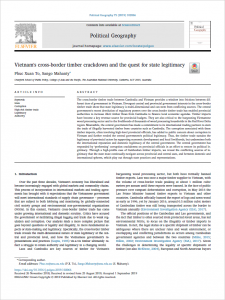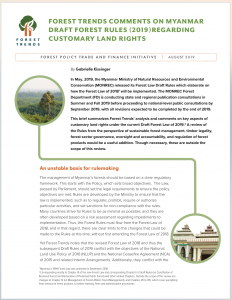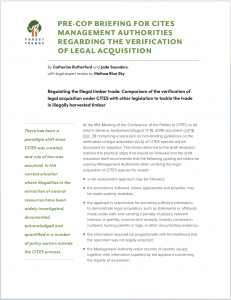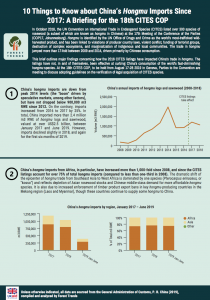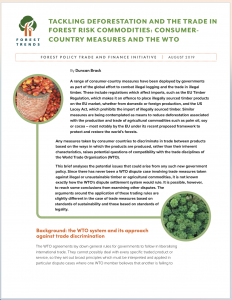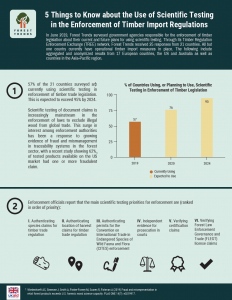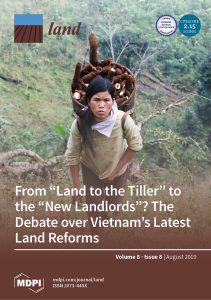Natural Resource Governance Reform and the Peace Process in Myanmar
By Kevin WoodsThis report summarizes the role of natural resources in armed conflict and the current peace process in Myanmar. It serves as a baseline study for efforts to promote equitable and accountable management of natural resources for peacebuilding. The main findings overall indicate a lack of meaningful progress on moving towards natural resource good governance reform[…]
Dependent Documents
Contribuciones potenciales de la infraestructura preincaica de infiltración de agua para la seguridad hídrica en los Andes
By Boris F. Ochoa-Tocachi, Juan D. Bardales, Javier Antiporta, Katya Pérez, Luis Acosta, Feng Mao, Zed Zulkafli, Junior Gil-Ríos, Oscar Angulo, Sam Grainger, Gena Gammie, Bert De Bièvre y Wouter BuytaertA nivel mundial, los recursos hídricos están sometidos a un fuerte estrés producto de la creciente variabilidad climática y las presiones ejercidas por el ser humano. En los Andes tropicales, las culturas preincaicas desarrollaron tecnologías de siembra y cosecha de agua basadas en la naturaleza para manejar los riesgos de sequías en climas naturales extremos. […]
Dependent Documents
Resumen de investigación: Contribuciones potenciales de la infraestructura preincaica de infiltración de agua para la seguridad hídrica en los Andes
By Boris F. Ochoa-Tocachi, Juan D. Bardales, Javier Antiporta, Katya Pérez, Luis Acosta, Feng Mao, Zed Zulkafli, Junior Gil-Ríos, Oscar Angulo, Sam Grainger, Gena Gammie, Bert De Bièvre y Wouter BuytaertResearch Summary: Potential contributions of pre-Inca water infiltration infrastructure for water security in the Andes
By Boris F. Ochoa-Tocachi, Juan D. Bardales, Javier Antiporta, Katya Pérez, Luis Acosta, Feng Mao, Zed Zulkafli, Junior Gil-Ríos, Oscar Angulo, Sam Grainger, Gena Gammie, Bert De Bièvre, and Wouter BuytaertHow Has the EU Timber Regulation Enforced the European Trade of Timber in 2018?
By Marigold NormanWhat are the links between trade and enforcement activity? Forest Trends assessed the latest trade data for 2018.
Dependent Documents
Email Signup
Subscribe to any of Forest Trends’ mailing lists to keep up with the news, publications, and events that interest you.
Having Trouble?
If you experience any technical difficulties on our site, please contact Genevieve Bennett, Communications Manager.
Vietnam’s Cross-border Timber Crackdown and the Quest for State Legitimacy
By Phuc Xuan To and Sango MahantyThe Government of Vietnam’s recent devolution of regulatory powers over the cross-border trade between Cambodia and Vietnam has enabled provincial authorities to increase illicit timber flows from Cambodia to finance local economic agendas. Timber imports have become a key revenue source for provincial budgets. Meanwhile, the central government has made a commitment to its international[…]
Forest Trends Comments on Myanmar Draft Forest Rules (2019) Regarding Land Rights
By Gabrielle KissingerIn May, 2019, the Myanmar Ministry of Natural Resources and Environmental Conservation (MONREC) released its Forest Law Draft Rules which elaborate on how the Forest Law of 20181 will be implemented. The MONREC Forest Department (FD) is conducting state and regional publication consultations in Summer and Fall 2019 before proceeding to national-level public consultations by[…]
Dependent Documents
Pre-Cop Briefing for CITES Management Authorities Regarding the Verification of Legal Acquisition
Regulating the illegal timber trade: Comparison of the verification of legal acquisition under CITES with other legislation to tackle the trade in illegally harvested timber.
By Catherine Rutherford and Jade SaundersThere has been a paradigm shift since CITES was created, and rule of law was assumed, to the current situation where illegalities in the extraction of natural resources have been widely investigated, documented, acknowledged and quantified in a number of policy sectors outside the CITES process. In order to facilitate consistency, this briefing paper outlines[…]
Dependent Documents
Exposé Pré-Cop À L’intention Des Organes De Gestion De La Cites Concernant La Vérification De La Légalité De L’acquisition
Réglementation du commerce illégal de bois : Comparaison en matière de vérification de la légalité d’acquisition au titre de la Cites par rapport à d’autres mesures législatives pour lutter contre le commerce de bois illégalement récolté.
By Catherine Rutherford et Jade Saunders, avec expertise juridique de Melissa Blue SkyExposición Pre-Cop Para Las Autoridades Administrativas De La Cites Respecto De La Comprobación De Adquisición Legal
Reglamentación del comercio ilegal de madera: Comparando la comprobación de la adquisición legal en virtud de la Cites respecto de otras medidas legislativas para luchar contra el comercio de madera cosechada ilegalmente.
By Catherine Rutherford y Jade Saunders, con revisión experta juridica de Melissa Blue Sky10 Things to Know about China’s Hongmu Imports Since 2017: A Briefing for the 18th CITES COP
By Naomi Basik TreanorIn October 2016, the UN Convention on International Trade in Endangered Species (CITES) listed over 300 species of rosewood (a subset of which are known as hongmu in Chinese) at the 17th Meeting of the Conference of the Parties (COP17, Johannesburg). Hongmu is identified by the UN Office of Drugs and Crime as the world’s[…]
Tackling Deforestation and the Trade In Forest Risk Commodities: Consumer-Country Measures and the WTO
By Duncan BrackA range of consumer-country measures have been deployed by governments as part of the global effort to combat illegal logging and the trade in illegal timber. These include regulations which affect imports, such as the EU Timber Regulation, which makes it an offence to place illegally sourced timber products on the EU market, whether from[…]
5 Things to Know about the Use of Scientific Testing in the Enforcement of Timber Import Regulations
By Marigold Norman and Jade SaundersIn June 2019, Forest Trends surveyed government agencies responsible for the enforcement of timber legislation about their current and future plans for using scientific testing. Through its Timber Regulation Enforcement Exchange (TREE) network, Forest Trends received 25 responses from 21 countries. All but one country currently have operational timber import measures in place. The following[…]
The Debate over Vietnam’s Latest Land Reforms
From “Land to the Tiller” to the “New Landlords”?
By Phuc ToA new paper published by Land journal discusses policy debates on smallholder versus large-scale company governance. It highlights possible risks in government land policy that favors large-scale companies and neglecting smallholders. While the paper focuses on Vietnam case study, its implications travel far beyond the country. Abstract: Between Vietnam’s independence and its reunification in 1975,[…]

